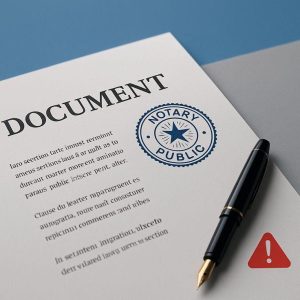When it comes to legal matters, the role of a notary in verifying and certifying important documents cannot be overstated. Notaries are essential public officials appointed by state governments. Their purpose is to act as unbiased witnesses in legal proceedings.
They play a crucial role in verifying the identity of individuals signing important documents and ensuring their voluntary participation and understanding. There is, however, a cost associated with notarizing a document. Read on to get a comprehensive understanding of notary fees.
How Much Does a Notary Cost?
Depending on the jurisdiction, notaries may also administer oaths, certify copies of documents, and perform other duties related to their role. The cost of notary can very for few factors. The average cost of a notary is between $2 and $15 per document.
A mobile notary will cost more, however. You pay for the convenience of the notary coming to your location.
Factors That Shape Notary Costs
The cost of notary services is influenced by various factors, which can differ depending on the location and the individual notary. Here are some key considerations to keep in mind:
- State Regulations: Each state has its own guidelines and fee structures for notary services. These regulations are in place to prevent excessive charges and protect consumers from exploitation.
- Document Complexity: The complexity and nature of the document being notarized can impact the cost. Standard documents such as acknowledgments and jurats often have predetermined fees. However, more specialized documents, like loan signings or international transactions, may require additional expertise and time, resulting in higher costs.
- Mobile Notary Services: Notaries may offer mobile services, conveniently traveling to clients’ locations. The fees for mobile services typically account for travel expenses, including time spent and transportation costs. Such services are particularly beneficial for individuals with limited mobility or busy schedules.
- Urgency and Time Constraints: If you find yourself in need of immediate notarization or have time-sensitive documents, some notaries may charge higher fees to accommodate your requirements outside their regular working hours.
Key Terms for Notary Services
- Notary Public: An official authorized by the government to certify legal documents and administer oaths.
- Flat Fee: A fixed and non-negotiable price charged for notary services, regardless of the number or type of documents involved.
- Per Page Charge: A fee assessed by the notary for each page of a document that requires notarization.
- Travel Fee: A charge imposed by the notary for traveling to the location where the documents are to be signed.
- Discounted or Free Notary Services: Financial institutions, libraries, and government offices may offer notary services at a reduced cost.
Familiarize yourself with any specific fee schedules mandated by your state for particular notarial acts, such as administering oaths or certifying copies. By being aware of the regulations in your area, you can avoid surprises and ensure a smooth notarization process.
Conclusion
Our information will help you navigate the world of notary services more effectively. When you know the average costs involved, you can approach legal transactions requiring notarization with confidence. Remember to research local regulations and openly discuss fees with your chosen notary to foster transparency and prevent any misunderstandings along the way.






